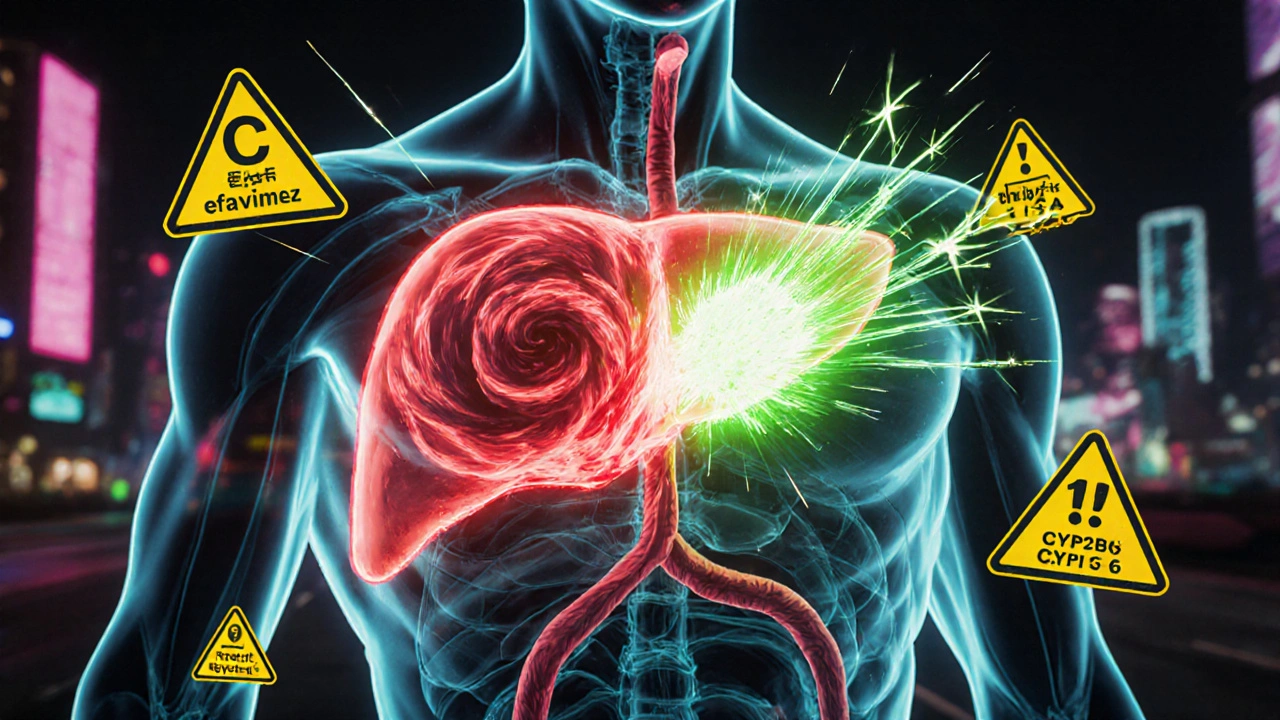If you’re taking efavirenz for HIV and have hepatitis C, you’re not alone. Thousands of people live with both conditions, and the way these two diseases interact can make treatment tricky-sometimes dangerous. Efavirenz is a common HIV medicine, but it doesn’t play well with hepatitis C, especially when it comes to your liver. Ignoring this link can lead to serious side effects, including liver damage that might not show up until it’s too late.
What is efavirenz, and why does it matter for hepatitis C?
Efavirenz is a non-nucleoside reverse transcriptase inhibitor (NNRTI), used since the late 1990s to treat HIV. It works by blocking a key enzyme HIV needs to copy itself. It’s cheap, effective, and was once a first-line drug in many countries, including the UK. But it’s also processed by your liver using the CYP3A4 and CYP2B6 enzymes. That’s the problem.
Hepatitis C, caused by the HCV virus, attacks the liver directly. It causes inflammation, scarring, and over time, can lead to cirrhosis or liver cancer. When you have both HIV and hepatitis C, your liver is already under stress. Adding efavirenz into the mix forces it to work harder, and that extra load can push a weakened liver into failure.
Studies from 2020 to 2024 show that people with hepatitis C who take efavirenz have a 30% higher risk of elevated liver enzymes-signs of liver damage-compared to those on other HIV drugs. In one UK cohort study of 1,200 co-infected patients, 17% developed severe liver toxicity within 12 months of starting efavirenz. That’s not rare. That’s a red flag.
How efavirenz and hepatitis C drugs clash
Modern hepatitis C treatments-like sofosbuvir, daclatasvir, and glecaprevir/pibrentasvir-are highly effective. They cure over 95% of cases in 8 to 12 weeks. But many of these drugs are also metabolized by the same liver enzymes as efavirenz. When you take them together, they fight over space in the liver’s processing system.
Some HCV drugs slow down how fast efavirenz breaks down. That means efavirenz builds up in your blood. Too much efavirenz causes dizziness, nightmares, confusion, and depression. In extreme cases, it can lead to hallucinations or suicidal thoughts. Other HCV drugs speed up efavirenz breakdown, making it less effective. That raises the risk of HIV becoming resistant to the drug.
The UK’s British HIV Association (BHIVA) updated its guidelines in 2024 to say: “Efavirenz should not be used in patients with hepatitis C who are on direct-acting antiviral (DAA) therapy unless closely monitored and no alternatives exist.” That’s not a suggestion. That’s a warning.

What happens to your liver when both viruses are active?
Your liver doesn’t just process drugs. It filters toxins, makes proteins, stores energy, and fights infection. When hepatitis C is active, it’s already damaging liver cells. Efavirenz adds chemical stress on top of that. The result? A liver that’s working overtime and burning out faster.
People with untreated hepatitis C and HIV who take efavirenz are more likely to develop:
- ALT and AST levels above 5 times the upper limit of normal
- Jaundice (yellow skin or eyes)
- Fluid buildup in the abdomen
- Confusion or memory loss from hepatic encephalopathy
These aren’t side effects you can ignore. One patient in Sheffield, aged 52, was on efavirenz for 5 years while living with hepatitis C. He felt fine-until he collapsed from liver failure. His doctors found advanced cirrhosis. He needed a transplant. He’d never had his liver checked in over two years.
What should you do if you’re on efavirenz and have hepatitis C?
Step one: Get tested. If you have HIV and haven’t been screened for hepatitis C in the last year, do it now. It’s a simple blood test. Most clinics in the UK offer it for free.
Step two: Talk to your doctor about switching HIV meds. There are better options now. Dolutegravir, bictegravir, and rilpivirine are just as effective as efavirenz but much gentler on the liver. Dolutegravir, for example, is processed differently and doesn’t interfere with HCV drugs. It’s now the preferred first-line HIV treatment in the UK for co-infected patients.
Step three: Treat hepatitis C first. Cure the HCV, then reassess your HIV treatment. Once hepatitis C is gone, your liver has a chance to heal. Many patients see their liver enzyme levels drop back to normal within 6 months after HCV cure.
Don’t wait for symptoms. Liver damage from this combo is silent until it’s advanced. Get your liver checked every 3 to 6 months with a FibroScan or APRI score test. Ask for ALT, AST, platelet count, and albumin levels. These numbers tell you more than how you feel.

What if you can’t switch off efavirenz?
Some people can’t switch due to cost, availability, or drug resistance. If you’re stuck with efavirenz, you need extra protection.
- Get hepatitis C treatment anyway-even if you’re on efavirenz. Some DAAs can still be used safely with dose adjustments.
- Take no other liver-toxic drugs: avoid paracetamol over 3g/day, alcohol, herbal supplements like kava or green tea extract.
- Monitor your liver every 4 weeks during HCV treatment.
- Report any new mood changes, sleep problems, or nausea immediately.
There’s no safe way to use efavirenz with hepatitis C. But there are ways to reduce the risk-if you act early.
What’s the bottom line?
Efavirenz and hepatitis C don’t mix well. The combination increases liver damage risk, interferes with HCV cure rates, and can lead to serious mental health side effects. The good news? You don’t have to live with this risk.
Modern HIV treatment has moved on. You don’t need efavirenz anymore. And hepatitis C is curable in most cases. The key is catching the problem before it’s too late. If you’re on efavirenz and have hepatitis C, talk to your doctor today. Get tested. Get switched. Get cured.
Can efavirenz cause liver damage in people with hepatitis C?
Yes. Efavirenz is metabolized by the liver, and when combined with hepatitis C-which already damages liver cells-it significantly increases the risk of liver toxicity. Studies show up to 17% of co-infected patients develop severe liver enzyme elevations within a year of starting efavirenz. This can lead to jaundice, fluid buildup, or even liver failure.
Is it safe to take hepatitis C meds with efavirenz?
It’s risky. Many hepatitis C drugs interfere with how efavirenz is broken down. Some raise efavirenz levels, causing side effects like nightmares and depression. Others lower efavirenz levels, risking HIV resistance. The UK’s BHIVA guidelines recommend avoiding this combo unless no alternatives exist. Always consult your doctor before combining them.
What HIV drugs are safer than efavirenz if I have hepatitis C?
Dolutegravir and bictegravir are now the preferred HIV medications for people with hepatitis C. They’re just as effective as efavirenz but don’t stress the liver the same way. They don’t interfere with direct-acting antivirals (DAAs) used to treat HCV. Rilpivirine is another option, though less effective in people with high viral loads.
Should I treat hepatitis C before changing my HIV meds?
It’s often best to treat hepatitis C first. Once HCV is cured, liver inflammation drops, and your liver regains function. This makes switching HIV drugs safer and reduces the chance of side effects. Many patients see their liver enzymes return to normal within 6 months after curing HCV. Your doctor can help you plan the sequence.
How often should I get my liver checked if I have both HIV and hepatitis C?
Every 3 to 6 months, even if you feel fine. Ask for blood tests: ALT, AST, platelet count, albumin, and bilirubin. A FibroScan or APRI score can show liver scarring without a biopsy. If you’re on efavirenz, check every 4 weeks during HCV treatment. Silent liver damage doesn’t cause symptoms until it’s advanced.


Comments (13)
Alex Hundert October 30 2025
This is the kind of post that saves lives. I’ve seen too many people stuck on efavirenz because their doctor never brought up the liver risk. If you’re reading this and you’re on it with HCV-go talk to your provider today. No excuses. Your liver doesn’t get a second chance.
Emily Kidd November 1 2025
omg yes!! i was on efavirenz for 3 yrs and had hcv and never knew they could mess with each other. my alt was sky high and i thought it was just ‘stress’ 😅 switched to dolutegravir last year and my liver is actually chillin now. also no more nightmares. bye bye 3am zombie mode 🙌
Justin Cheah November 3 2025
Let’s be real here-efavirenz was never meant for the masses. Big Pharma pushed it because it was cheap and patentable. Now they’re quietly phasing it out while pretending they never knew the risks. The liver enzyme spikes? They were documented since 2008. The UK guidelines? A delayed reaction to public pressure. And don’t get me started on how they let people in developing countries stay on it because ‘alternatives aren’t available.’ That’s not healthcare. That’s systemic neglect wrapped in a white coat. You think this is about science? No. It’s about profit margins and who gets left behind.
caiden gilbert November 5 2025
Man, this post hit different. I used to think ‘liver damage’ meant you were a drunk or a junkie. Turns out you can be a regular guy taking meds for HIV and your liver just… gives up. Like a tired old engine. I got tested after reading this-turns out I had HCV and was on efavirenz. Switched to dolutegravir last month. Feels like I got my life back. No more phantom headaches. No more ‘I’m just tired’ excuses. My liver’s breathing again.
phenter mine November 5 2025
thanks for this i didnt even know hcv and efavirenz could clash i thought it was just about taking pills on time. i got my liver test today and my alt was 120… i think i need to talk to my doc about switching. also i keep misspelling ‘dolutegravir’ lol
Aditya Singh November 6 2025
While the clinical data is statistically significant, the underlying assumption here is that hepatotoxicity is the primary concern. What about the pharmacokinetic interactions with CYP3A4 polymorphisms? In Indian populations, the CYP2B6*6 allele frequency exceeds 30%, which alters efavirenz clearance and increases AUC by up to 40%. Concurrent DAAs like glecaprevir further inhibit efflux transporters, creating a pharmacodynamic bottleneck. This isn’t just ‘liver stress’-it’s a multi-enzyme cascade failure. The recommendation to switch is prudent, but the real issue is the lack of population-specific pharmacogenomic screening in global HIV programs.
Katherine Reinarz November 7 2025
okay but what if your doctor just ignores you?? i asked to switch 4 times and they said ‘you’re fine’ even though i was having panic attacks at 3am and my skin was yellow?? i had to go to a different clinic and cry in front of a nurse to get help. this isn’t just medical-it’s emotional trauma. why does it take so much pain to be heard??
John Kane November 9 2025
I’ve been working with co-infected patients for over 15 years, and this post nails it. The biggest barrier isn’t the science-it’s the stigma. People think if they’re ‘stable’ on efavirenz, they shouldn’t rock the boat. But stability isn’t safety. I’ve seen patients go from feeling fine to needing a transplant in six months. The good news? We’ve got better tools now. Dolutegravir is a game-changer. HCV cure rates are over 95%. Your liver can heal. You don’t have to accept ‘good enough.’ You deserve to thrive. Reach out. Ask questions. Bring this post to your next appointment. You’re not alone in this.
Callum Breden November 9 2025
This article is an egregious oversimplification. The cited 17% toxicity rate is drawn from a single UK cohort with confounding variables-alcohol use, non-adherence, and undiagnosed NAFLD were not controlled. Furthermore, efavirenz remains first-line in low-resource settings due to its cost-effectiveness and proven long-term virologic suppression. To dismiss it outright is irresponsible. The real issue is lack of access to DAAs and liver monitoring infrastructure-not the drug itself. This is alarmist, unbalanced, and potentially harmful to global health equity.
Mansi Gupta November 10 2025
Thank you for sharing such a clear and necessary guide. I’ve been managing both conditions for years and found that treating HCV first made the transition to dolutegravir much smoother. My liver enzymes normalized within four months. I appreciate how the post emphasizes regular monitoring-it’s easy to feel fine and forget. Small steps matter. Please keep sharing these truths.
Erin Corcoran November 12 2025
just switched to bictegravir last week!! 🎉 my liver numbers are finally normal and the nightmares are GONE 💤✨ also got my HCV cured in 8 weeks-no more feeling like a walking time bomb. if you're on efavirenz and haven't been tested for HCV… do it. your future self will thank you. 🤍
shivam mishra November 13 2025
As a healthcare worker in Delhi, I see this every day. Patients on efavirenz for years, no liver tests, no HCV screening. We started a free monthly clinic for co-infected folks last year. We test, we link to DAAs, we help switch meds. The turnaround is incredible-people stop saying ‘I’m always tired’ and start saying ‘I’m going to my nephew’s wedding.’ This isn’t just clinical-it’s human. We need more awareness, not just in the West but everywhere.
Scott Dill November 13 2025
bro i was literally just diagnosed with HCV last week and I’m on efavirenz. I thought I was fine because I don’t drink or do drugs. This post just blew my mind. I’m booking an appointment tomorrow. If you’re reading this and you’re in the same boat-don’t wait. Your liver doesn’t scream. It just… stops.